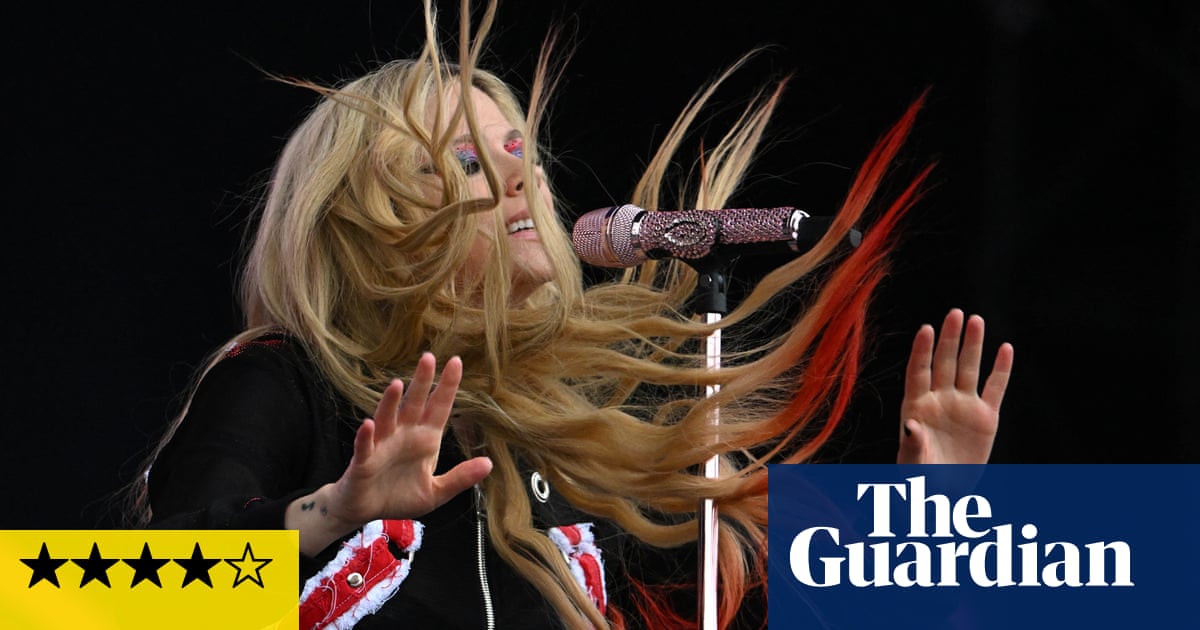If Shania Twain’s legends slot feels strangely timely given the amount of pop-country currently in the UK singles chart, you could say the same thing about Avril Lavigne’s performance, which seems a little like a legends slot in all but name. Pop punk is very much a thing again, and while you can trace the genre’s roots back to the Buzzcocks’ debut single, no artist can claim to have made punk more pop than Avril Lavigne did in the early 00s: refashioning its sound – and a dash of grunge’s angst – as bratty but harmless tweenage entertainment. She shifted so many copies of her debut album in the process that its follow-up was deemed a commercial disappointment on the grounds that only sold 10m as opposed to its predecessor’s 16m. Moreover, pop punk’s current practitioners have been more than happy to pay tribute to a woman they clearly consider to be the OG: Olivia Rodrigo covered Complicated when she played Glastonbury two years ago.
“Here’s to never growing up,” Lavigne sings, as well she might: after briefly dabbling with a more mature sound – moody Christian rock – on 2019’s Head Above Water, she clearly realised which way the wind was blowing and leaned back into her original mall-rat teen-punk persona.
On one hand, you have to feel for her: the song’s protestations notwithstanding, it has to be weird to be trapped in a perpetual fishnets-and-tartan-miniskirt adolescence, doomed for the rest of eternity to write songs called things like Love Sux and Bite Me, and to have to screw your face up, stick your tongue out and do the devil horns things with your hands every time a camera’s pointed at you. On the other, look at the size of that crowd.
In another example of this year’s weird scheduling choices, she’s on the Other stage at the same time Janelle Monáe is on the Pyramid: the latter plays to a sparse audience, while there’s so many people crammed into the Other stage that stewards are forced to close one entrance to stop anyone else turning up. Inside the audience are, as the band Lavigne professes to enjoy singing along to at the top of her lungs would put it, packt like sardines in a crushd tin box. There are loads of early thirtysomething ladies on people’s shoulders, not merely singing, but cathartically emoting like mad to Losing Grip and I’m With You; the moment when Lavigne organises a crowd singalong to the latter seems a little surplus to requirements, given that everyone in the field already seems to bellowing along to every word she sings anyway.
She’s been critically mocked as cosplay punk and rounded-edge grunge, and the idea of Avril Lavigne being widely hailed as a major influence would have been a very peculiar notion to conjure with in 2004, which just goes to show how wrong you can be. But a song like Don’t Tell Me, which advised her her fans not to feel pressurised into having sex, clearly spoke very directly to a generation of women only a few years younger than Lavigne herself when her debut album was released.
Her voice sounds great, though for someone who evidently had such an impact on people’s lives, she’s a coolly professional rather than wildly engaging stage presence. It scarcely matters. Anyone who wasn’t under her spell in the early 00s might be startled at how robust her songs sound 20 years on. They’re exceptionally well written, and moreover there doesn’t seem to be much of a drop off in musical quality when the set veers away from her first two albums into her more recent oeuvre. Certainly, there’s no drop off in the audience’s enthusiasm. The field remains packed and noisily devoted to the end – a rapturously-received run through Sk8r Boi – which suggests they’re here for more than mere nostalgia.

